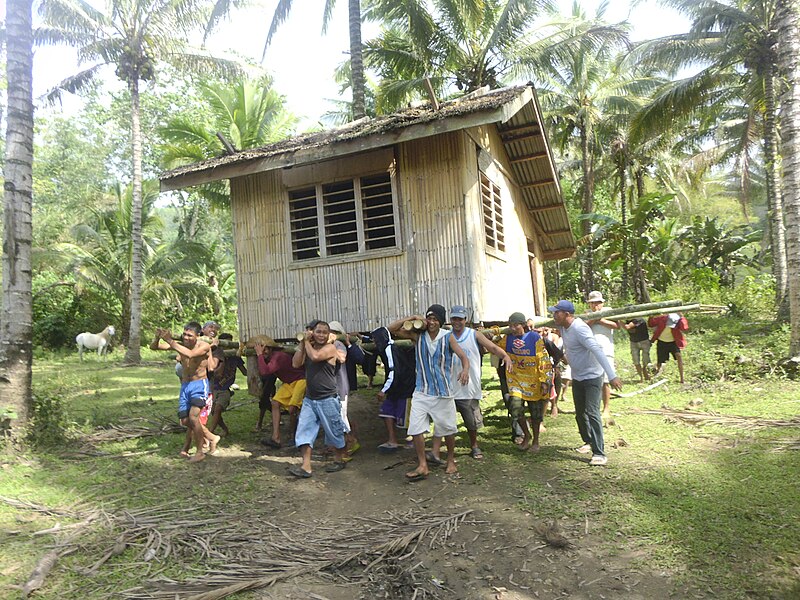Bayanihan

Credit: Bonvallite
| Giver: | Community |
|---|---|
| Receiver: | Individual or unstructured/informal group |
| Gift: | Time |
| Approach: | Other |
| Issues: | 11. Sustainable Cities and Communities |
| Included in: | Volunteerism |
In Filipino culture, bayanihan is a form of volunteerism rooted in shared cultural identity. Bayanihan derives from bayan, a Tagalog word meaning town, community or nation. To practice bayanihan is to perform an act of service that benefits the collective, while an individual who engages in bayanihan is referred to as a bayani, a term that can mean both “patriot” and “hero.” In this sense, bayanihan implies an act of self-sacrifice for the greater good.
Traditionally, bayanihan referred to a custom in which community members contributed their time and labor to help a neighbor relocate a house. Over time, bayanihan has come to refer to a range of collaborative activities, including coming together to clear debris and rebuild homes following a natural disaster. Originating out of the distinctive geography of the Philippines, bayanihan reflects the cooperative spirit and sense of solidarity that underpins society throughout the archipelago.
The practice of relocating homes ties directly to the precariousness of the climate and terrain of the Philippines. Vulnerable to frequent flooding and mudslides, traditional Filipino dwellings – known as bahay kubo – are erected on stilts and constructed out of palm leaves, bamboo and other lightweight materials. These features make the bahay kubo relatively easy to transport if a homeowner’s property is threatened.
In small villages, the ritual of bayanihan is a major event, and involves the entire community. A group of a dozen or more men begin by securing bamboo poles to the underside of the house with rope, before raising it off the ground in unison. As the men haul the structure to its new location, the women of the community follow along, cheering encouragement or simply chatting among themselves. Once the men have finished setting the house onto the new property, the homeowners serve a celebratory meal to express their gratitude.
The communal rituals surrounding house relocation in the Philippines have gradually faded from regular practice. The use of more durable materials such as concrete and heavy timber in homebuilding, combined with widespread migration from rural to urban areas, have rendered the custom impractical in most cases.
Still, in modern Filipino society, the ethos of mutual aid embodied in bayanihan persists in various forms. In addition to coming to each other’s assistance in emergencies, Filipinos regularly volunteer within the community, whether for a specific charitable cause or to foster camaraderie with their neighbors. Through this shared commitment to the common good, the spirit of bayanihan remains a vital aspect of everyday life in the Philippines.
Contributor: Stephen Meyer
| Source type | Full citation | Link (DOI or URL) |
|---|---|---|
| Publication |
Ang, Gertrude R. “The Bayanihan Spirit: Dead or Alive?” Philippine Quarterly of Culture and Society 7, no. 1/2 (March/June 1979): 91-93. |
https://www.jstor.org/stable/29791626 |
| Publication |
Barrameda, Teresita V., and Arlen Sandino Barrameda. “Rebuilding Communities and Lives: The Role of Damayan and Banayihan in Disaster Resiliency.” Philippine Journal of Social Development 3 (2011): 132-51. |
https://cswcd.upd.edu.ph/wp-content/uploads/2021/10/PJSD-Vol-3-2011_Barrameda.pdf |
| Publication |
Solis, Christian U. “Pakikipagkapwa–Tao and Bayanihan Spirit in Community Pantries: Paul Ricoeur on Filipinos as Responsible Human Beings.” Religion and Social Communication 21, no. 1 (2023): 165-89. |
https://asianresearchcenter.org/document/download/511/1685419282-religion-and-social-communication-21-no-1-2023.pdf#page=170 |
| Book |
Su, Yvonne, Ladylyn Mangada, and Ara Joy Pacoma. “Beyond Bayanihan: Overcoming Myths of Community Resilience in Typhoon Haiyan Post-Disaster Recovery.” In Disasters in the Philippines Before and After Haiyan, edited by Glenda Tibe Bonifacio and Roxanna Balbido Epe, 267-86. Bristol: Bristol University Press, 2023. |
https://doi.org/10.51952/9781529222920.ch013 |
| Publication |
Tindowen, Darin Jan C., and Honey Lei N. Bagalayos. “All for One, One for All: The Role of Filipino Pro-Social Behaviours in Building a Disaster-Resilient Community.” International Journal of Sustainable Society 10, no. 3 (2018): 243-56. |
http://dx.doi.org/10.1504/IJSSOC.2018.096275 |